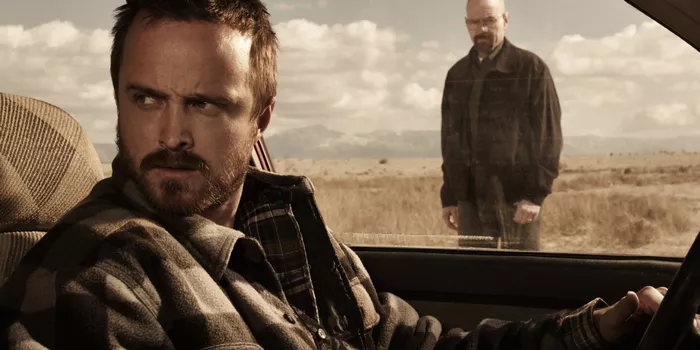Breaking Bad, one of the most acclaimed television series of all time, was lauded not only for its gripping storyline and complex characters but also for its meticulous character development. Among the standout characters, Jesse Pinkman, portrayed by Aaron Paul, underwent one of the most profound transformations throughout the series. In this article, we’ll delve into the fascinating but ultimately rejected idea of Jesse taking over Walter White’s drug empire in the final episodes and why it would have undermined the legacy of his character.
Jesse’s Exceptional Character Development
One of the hallmarks of Breaking Bad is its ability to take morally complex characters and evolve them over time. Jesse Pinkman’s journey from a small-time meth cook and drug dealer to a deeply conflicted and morally tormented character was nothing short of remarkable. His evolution was marked by moments of vulnerability, self-discovery, and a desperate yearning for redemption. This carefully crafted character development made Jesse one of the most relatable and sympathetic figures in the series.
Jesse’s character arc was defined by the constant struggle between his better instincts and the corrupting influence of the criminal world he was entangled in. He was introduced as a young, reckless drug manufacturer and distributor, but as the series progressed, viewers witnessed his growth and transformation. Jesse’s moral compass, which often clashed with the ruthlessness of Walter White, made him a fan favorite. His inner turmoil and the weight of his actions weighed heavily on his shoulders, and this internal conflict made him a character that viewers could not help but root for.
The Original Plan: Jesse’s Unexpected Ascent to Power
In the initial conceptualization of Breaking Bad‘s final episodes, Jesse Pinkman was slated to take over Walter White’s drug empire. This plan, while intriguing on the surface, would have been a major departure from Jesse’s character arc and the emotional journey viewers had followed him on throughout the series.
The idea of Jesse, a character marked by his inner turmoil and moral compass, suddenly stepping into the role of a drug lord felt incongruent with the authenticity that Breaking Bad consistently delivered. Jesse had been through unimaginable trauma and guilt, especially following the murder of an innocent child, Jane Margolis. This traumatic event had a profound impact on Jesse’s psyche and left scars that ran deep. Asking him to fill the void left by Walter White’s absence as a ruthless drug kingpin seemed discordant with his character’s legacy.
Jesse’s Emotional Journey: The Strength of His Ending
One of the defining strengths of Breaking Bad‘s final season was the contrast between the journeys of its two central characters, Walter White and Jesse Pinkman. While Walter descended further into darkness, Jesse’s path led him toward self-discovery, liberation, and ultimately, the pursuit of freedom.
The emotional resonance of Jesse’s ending as a free man was undeniable. After enduring so much suffering and manipulation at the hands of Walter, his liberation represented a glimmer of hope and a sense of closure for viewers who had invested deeply in his character. It was a conclusion that felt authentic and satisfying, allowing Jesse to break free from the cycle of violence and destruction that had plagued his life for so long.
Jesse’s journey throughout Breaking Bad was a testament to the power of redemption and the human capacity for change. His character arc was a carefully woven tapestry of struggle and growth, making his ending as a free man all the more poignant. In a series filled with moral ambiguity and the consequences of one’s choices, Jesse Pinkman’s legacy was preserved by giving him a chance at a new beginning. It was a conclusion that not only honored his character’s evolution but also left a lasting impact on the hearts of fans who had followed his turbulent journey from start to finish.
Conclusion: Jesse Pinkman’s Legacy Preserved
In conclusion, the proposed idea of Jesse Pinkman taking over Walter White’s drug empire in Breaking Bad‘s final episodes, while intriguing, would have undermined the legacy of his character. The strength of Jesse’s journey throughout the series lay in his evolution from a troubled young man to a survivor who finally had the chance to find his own path. Breaking Bad‘s decision to preserve Jesse Pinkman’s legacy by granting him his hard-earned freedom was not only a masterstroke of storytelling but also a tribute to a character who had captured the hearts of fans worldwide.
Jesse Pinkman’s ending as a free man was a testament to the power of character development and storytelling. It allowed viewers to witness his transformation from a lost soul to a survivor who finally had the chance to find his own path. Breaking Bad‘s decision to preserve Jesse Pinkman’s legacy by granting him his hard-earned freedom was not only a masterstroke of storytelling but also a tribute to a character who had captured the hearts of fans worldwide. It served as a reminder that, even in the darkest of worlds, redemption and the pursuit of a better future are possible, making Jesse Pinkman’s journey one of the most memorable and impactful in the realm of television.

